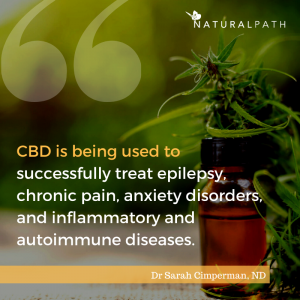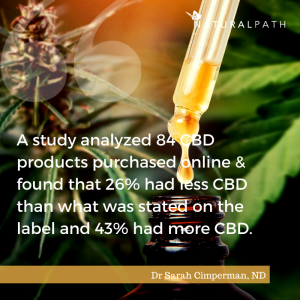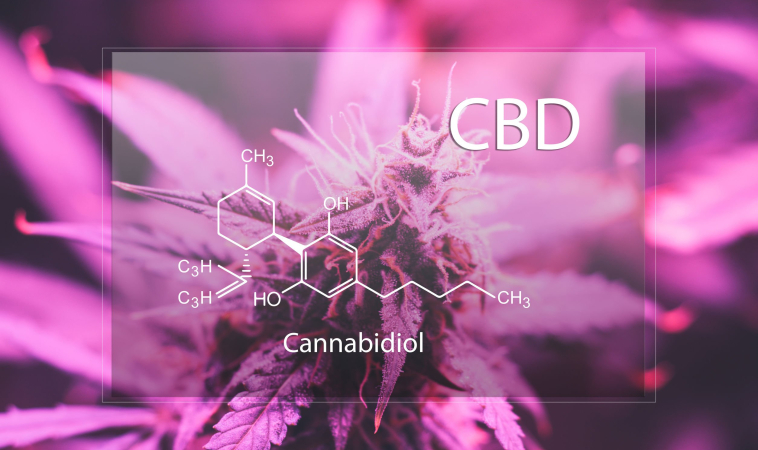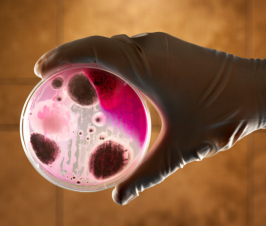Cannabidiol, better known as CBD, has been marketed as a natural cure for conditions ranging from anxiety and insomnia to epilepsy and chronic pain. At a time when ninety percent of people in the United States believe that the cannabis plant has medical benefits, CBD product sales are surging.1 Market researchers predict that U.S sales will go from 1.9 billion dollars in 2018 to 20 billion dollars by 2024.1
CBD has been marketed as a natural cure for conditions ranging from anxiety and insomnia to epilepsy and chronic pain
 CBD is derived from the cannabis plant, commonly known as marijuana and hemp. It belongs to a family of compounds called cannabinoids. Cannabinoids are also made by the body. Cannabinoids interact with cannabinoid receptors as part of the body’s endocannabinoid system or ECS. The ECS plays an important role in appetite, digestion, metabolism, mood, memory, sleep, hormones, and even cardiovascular function. It helps regulate the immune system2 and maintain homeostasis, the ideal internal conditions that allow the body to function optimally. The ECS is activated when cannabinoids bind to cannabinoid receptors, which are found all over the body, notably in the brain, lungs, liver, kidneys, spleen, bones, muscles, digestive tract, cardiovascular system, and reproductive systems. CBD can bind to cannabinoid receptors, eliciting the same effects.
CBD is derived from the cannabis plant, commonly known as marijuana and hemp. It belongs to a family of compounds called cannabinoids. Cannabinoids are also made by the body. Cannabinoids interact with cannabinoid receptors as part of the body’s endocannabinoid system or ECS. The ECS plays an important role in appetite, digestion, metabolism, mood, memory, sleep, hormones, and even cardiovascular function. It helps regulate the immune system2 and maintain homeostasis, the ideal internal conditions that allow the body to function optimally. The ECS is activated when cannabinoids bind to cannabinoid receptors, which are found all over the body, notably in the brain, lungs, liver, kidneys, spleen, bones, muscles, digestive tract, cardiovascular system, and reproductive systems. CBD can bind to cannabinoid receptors, eliciting the same effects.
The variety and availability of CBD products are ever-expanding. Supplements exist but CBD is also infused into beauty products like lotions, oils, creams, and bath bombs. It’s added to food and drinks like coffee, tea, beer, cocktails, gummy candy, chocolate bars, ice cream, and veggie bowls. CBD is infused into fabrics used to make workout wear and it’s even been added to pet products with promises of anti-inflammatory and immune-boosting effects.
CBD is popular but scientists are still learning about its applications and misinformation is widespread. Here are five common myths about CBD and where they went wrong.
#1 | CBD can make you high
More than a hundred cannabinoids have been identified in the cannabis plant. These include THC (also known as delta-9-tetrahydrocannabinol), which is psychoactive, and CBD, which is not. “Full-spectrum” or “whole plant” products contain an array of cannabinoids including CBD and trace amounts of THC along with other compounds like aromatic oils called terpenes and antioxidants called flavonoids. “Broad spectrum” products also contain an array of compounds including CBD and other cannabinoids, but no THC. “CBD Isolate” contains only CBD, no other compounds or cannabinoids. Alone, CBD does not cause intoxication.
#2 | There aren’t any research studies on CBD
A quick search for “CBD” on PudMed—maintained by the United States National Library of Medicine at the National Institutes of Health—turns up almost 7,000 citations. Many of these studies have been done on animals. We certainly need more studies on humans, but so far, results have been promising. Research supports the use of CBD in treatment-resistant epilepsy3 and chronic pain.4 Because of its anti-inflammatory actions in the body and its modulation of the immune system, scientists are exploring the therapeutic potential of CBD as a treatment for multiple sclerosis, rheumatoid arthritis, colitis, hepatitis, and certain types of cancers triggered by chronic inflammation.2CBD is also showing promise in the treatment of generalized anxiety disorder, panic disorder, social anxiety disorder, obsessive-compulsive disorder, and post-traumatic stress disorder.5
#3 | CBD isn’t safe
No one has ever died from using CBD and it is generally well-tolerated, although some people may experience fatigue, nausea, changes in appetite, and irritability. A comprehensive review of 132 original studies found that CBD was safe and well-tolerated even in chronic users and at high doses.6 In comparison to prescription drugs, CBD is safer than benzodiazepines used to treat anxiety, and opiates used to treat pain. According to the World Health Organization, pure CBD is not habit-forming and there is no evidence of public health problems associated with its use.7
#4 | One CBD product is as good as the next
 While CBD alone is safe, there are valid concerns about CBD products. The U.S. Food and Drug Administration has approved a prescription form of CBD called Epidiolex for the treatment of two rare and severe forms of epilepsy, but other forms of CBD are not FDA-regulated. There are no standards in regard to quality or standardization. Like all plants, cannabis has inherent natural variations and the concentration of CBD may differ according to the age of the plant, the growth and storage conditions, and the methods used for harvest and extraction. One study published in the Journal of the American Medical Association analyzed 84 CBD products purchased online and found that 26 percent had less CBD than what was stated on the label and 43 percent had more CBD.8
While CBD alone is safe, there are valid concerns about CBD products. The U.S. Food and Drug Administration has approved a prescription form of CBD called Epidiolex for the treatment of two rare and severe forms of epilepsy, but other forms of CBD are not FDA-regulated. There are no standards in regard to quality or standardization. Like all plants, cannabis has inherent natural variations and the concentration of CBD may differ according to the age of the plant, the growth and storage conditions, and the methods used for harvest and extraction. One study published in the Journal of the American Medical Association analyzed 84 CBD products purchased online and found that 26 percent had less CBD than what was stated on the label and 43 percent had more CBD.8
According to federal law, manufacturers of hemp-derived CBD products must test for THC content, but there are no testing requirements for CBD or contaminants like pesticides, heavy metals, residual solvents, microbes, or fungus. Some products may also contain fillers and chemical additives.
I look for broad spectrum CBD supplements that are made from organic U.S.-sourced hemp using a solvent-free extraction method. I also look for manufacturers who use third-party testing for potency and contaminants.
#5 | Self-prescribing is easy
The reality is that prescribing CBD isn’t easy, even for doctors. Studies show a wide variance when it comes to effective doses and adverse effects. Some say that side effects can start at 500 milligrams per day while others report that doses of 1,500 milligrams per day are safe and well-tolerated.6 Potential interactions add another layer of complexity. CBD can interact with some medications to change their metabolism, slowing down elimination and increasing levels in the bloodstream.
It’s never a good idea to self-prescribe. Talk to your doctor before taking any new supplement, including CBD. Discuss potential interactions with any medications or supplements you are taking and get individualized recommendations for dosage.
References:
1 BDS Analytics. U.S. CBD Market Anticipated to Reach $20 Billion in Sales by 2024. [Web page]. BDS Analytics website. https://bdsanalytics.com/u-s-cbd-market-anticipated-to-reach-20-billion-in-sales-by-2024/. Accessed January 27, 2020.
2 Nagarkatti P, Pandey R, Rieder SA, Hegde VL, and Nagarkatti M. Cannabinoids as novel anti-inflammatory drugs. Future Medicinal Chemistry. 2009;1(7):1333–1349. https://www.ncbi.nlm.nih.gov/pmc/articles/PMC2828614/
3 Szaflarski JP, Bebin EM, Comi AM, Patel AD, Joshi C, et al. Long-term safety and treatment effects of cannabidiol in children and adults with treatment-resistant epilepsies: Expanded access program results. Epilepsia. 2018;59(8):1540–1548. https://www.ncbi.nlm.nih.gov/pmc/articles/PMC6175436/
4 Ueberall MA, Essner U, and Mueller-Schwefe GHH. Effectiveness and tolerability of THC:CBD oromucosal spray as add-on measure in patients with severe chronic pain: analysis of 12-week open-label real-world data provided by the German Pain e-Registry. Journal of Pain Research. 2019;12:1577–1604. https://www.ncbi.nlm.nih.gov/pmc/articles/PMC6535492/
5 Blessing EM, Steenkamp MM, Manzanares J, and Marmar CR. Cannabidiol as a Potential Treatment for Anxiety Disorders. Neurotherapeutics. 2015;12(4):825-36. https://www.ncbi.nlm.nih.gov/pubmed/26341731
6 Bergamaschi MM, Queiroz RH, Zuardi AW, and Crippa JA. Safety and side effects of cannabidiol, a Cannabis sativa constituent. Current Drug Safety. 2011;6(4):237-49. https://www.ncbi.nlm.nih.gov/pubmed/22129319/
7 World Health Organization. CANNABIDIOL(CBD) Pre-Review Report, Agenda Item 5.2. Expert Committee on Drug Dependence, Thirty-ninth Meeting, Geneva, 6-10 November 2017. [Web page]. WHO website. https://www.who.int/medicines/access/controlled-substances/5.2_CBD.pdf. Accessed January 27, 2020.
8 Bonn-Miller MO, Loflin MJE, Thomas BF, et al. Labeling accuracy of cannabidiol extracts sold online. Journal of the American Medical Association. 2017;318(17):1708-1709. https://jamanetwork.com/journals/jama/fullarticle/2661569
 Sarah Cimperman, ND is the author of the new book, The Prediabetes Detox: A Whole-Body Program to Balance Your Blood Sugar, Increase Energy, and Reduce Sugar Cravings. She graduated from NCNM in 2002 and has a private practice in New York City. Her expertise has been featured on Fox News and Huffington Post and in Natural Health magazine, Whole Living magazine, and the Well Being Journal, among other publications. Dr. Cimperman also writes two blogs, A Different Kind Of Doctor and The Naturopathic Gourmet.
Sarah Cimperman, ND is the author of the new book, The Prediabetes Detox: A Whole-Body Program to Balance Your Blood Sugar, Increase Energy, and Reduce Sugar Cravings. She graduated from NCNM in 2002 and has a private practice in New York City. Her expertise has been featured on Fox News and Huffington Post and in Natural Health magazine, Whole Living magazine, and the Well Being Journal, among other publications. Dr. Cimperman also writes two blogs, A Different Kind Of Doctor and The Naturopathic Gourmet.

















